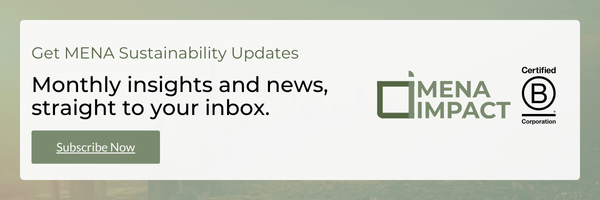Artificial Intelligence (AI) is rapidly transforming industries, economies, and societies worldwide, and its potential to drive sustainability in the MENA region is immense. Research shows that AI can significantly impact 79% of the Sustainable Development Goals (SDGs), making it a critical enabler in achieving the 2030 Agenda.
In the MENA region, AI adoption is accelerating at varied paces, with countries focusing on tailored applications to address unique challenges such as economic growth, youth employment, and climate action.
For instance:
- Egypt leverages AI in smart agriculture, e-learning, and e-health, driving digital transformation in key sectors.
- Saudi Arabia is revolutionizing healthcare with virtual hospitals and upskilling its workforce through AI.
- Morocco uses AI to advance agriculture, climate resilience, and smart cities, driven by its vibrant youth population.
As the founder of MENA Impact, the first platform providing sustainability resources dedicated to the MENA region, I’m excited to explore how AI can be a game-changer for sustainability. This newsletter dives into actionable insights, success stories, and the transformative potential of AI for advancing the SDGs in the Arab world.
AI in MENA: Where Do We Stand?
Artificial Intelligence is not just a buzzword in the MENA region—it’s a powerful economic driver poised to reshape industries and transform economies. According to a study by PwC (The Potential Impact of AI in the Middle East), AI could contribute $320 billion to the Middle East economy by 2030, accounting for 11% of the region’s GDP.
Here’s how AI is expected to shape the economic landscape across the region:
- UAE: Leading the charge, AI is projected to add $96 billion (13.6% of GDP) by 2030.
- Saudi Arabia: Close behind, AI is set to contribute $135.2 billion (12.4% of GDP).
- Bahrain, Kuwait, Oman, Qatar: Combined, AI could contribute $45.9 billion (8.2% of GDP).
- Egypt: AI is expected to add $42.7 billion (7.7% of GDP).
AI is driving innovation and efficiency in key sectors like retail, healthcare, education, and financial services. Public services and smart cities are also undergoing rapid transformation, with AI fueling advancements in economic growth and environmental sustainability.
The region’s growth trajectory is remarkable, with AI’s contribution to GDP growing annually at 20-34%. The UAE leads with an annual growth rate of 33.5%, followed by Saudi Arabia at 31.3%.
Spending on AI systems in the Middle East and North Africa region highlights this momentum. From $37.5 million in 2017 to over $100 million by 2021, the annual growth rate has been a staggering 32%.
MENA AI & Sustainability Initiatives
The MENA region is taking significant strides in leveraging Artificial Intelligence to address sustainability challenges and drive progress toward the Sustainable Development Goals (SDGs). Here are some notable initiatives:
1. AI4SD Initiative by UNDP and MBZUAI
- The UNDP Regional Bureau for Arab States launched the AI for Sustainable Development (AI4SD) platform to bridge information gaps and empower the region.
- Mohamed bin Zayed University of Artificial Intelligence (MBZUAI) serves as the founding knowledge partner for the AI4SD platform, with a focus on:
- Environmental resilience
- Water resources management
- Climate adaptation
- Social cohesion and reducing inequalities
- This partnership, highlighted during COP28, demonstrates AI’s transformative potential in addressing water scarcity, climate change, and other pressing issues in the region.
2. SDAIA’s Arabic Large Language Model (ALLaM)
- The Saudi Data and Artificial Intelligence Authority (SDAIA) collaborated with IBM to launch ALLaM, an open-source Arabic Large Language Model on IBM’s enterprise AI platform, WatsonX.
- ALLaM enhances Arabic language capabilities in AI, empowering businesses and government entities across the Arab world.
- This initiative positions Saudi Arabia as a leader in AI tailored to the region’s linguistic and cultural needs.
3. Google’s AI Opportunity Initiative for MENA
- Train 500,000 people in AI skills over two years, building on Google’s previous efforts that trained 3 million people in digital skills since 2018.
- Google.org committed $15 million through 2027 to ensure inclusive access to AI opportunities across the region.
- This initiative focuses on equipping individuals with AI skills, fostering regional innovation, and driving economic growth.
4. MENA Observatory on Responsible AI
- A collaborative platform promoting responsible AI tailored to the region’s unique needs.
- Focus Areas:
- Assessing AI readiness across MENA countries
- Exploring AI’s intersection with social justice and gender inclusion
- Promoting ethical AI governance
- The observatory supports localized AI policies and encourages equitable development through AI.
MENA Impact Startup Growth
The MENA region is witnessing a surge in startups harnessing AI to drive progress on the Sustainable Development Goals (SDGs), particularly in climate tech, health tech, and agri-tech sectors.
Climate Tech Innovations
One of the most promising advancements in AI for sustainability is the rise of climate tech startups, addressing pressing environmental challenges. Here are few examples:
- FortyGuard (UAE): Utilizes AI to analyze urban heat islands, providing data-driven solutions to reduce city temperatures.
- Archireef (UAE): Combines AI with 3D printing to restore marine ecosystems by designing and deploying artificial coral reefs.
- ATLAN Space (Morocco): Leverages AI-powered drones to combat illegal fishing and protect marine ecosystems, contributing to sustainable ocean practices.
Health Tech Making an Impact on the SDGs
Health tech startups are transforming healthcare delivery and outcomes in the MENA region:
- Quanterium Blockchain Solutions (UAE): Uses AI alongside blockchain, robotics, and augmented reality to create solutions such as 3D diagnostics and comprehensive healthcare management platforms.
- WEMA Health (UAE): Provides AI-powered platforms for personalized health monitoring and management.
Agri-Tech Making an Impact on the SDGs
Agriculture, a key sector in MENA, is also benefiting from AI innovations:
- Pure Harvest Smart Farms (UAE): Uses AI to optimize controlled-environment agriculture, enhancing resource efficiency and crop yields.
- DeepLeaf (Morocco): A deep learning lab focused on leveraging the AI technology to revolutionize the way we grow crops.
These startups showcase the region’s growing commitment to integrating AI with sustainability, driving measurable impact across sectors and advancing the SDGs.
Bridging the Gap for a Sustainable AI Future in the MENA Region
The Arab region stands at a critical juncture in its digital transformation journey. While countries like the UAE, Saudi Arabia, and Egypt lead the charge with robust AI strategies and rapid technological adoption, others remain at the initial stages, lacking clear frameworks to harness AI’s potential.
This digital divide is further exacerbated by unequal access to technology, disparities in ICT infrastructure, and demographic inequalities, including gender, urban-rural divides, and accessibility for people with disabilities. With approximately 30% of the population still offline—disproportionately women, rural residents, the elderly, and persons with disabilities—bridging this gap is essential to unlocking the full potential of AI and digital transformation.
Collaboration among Arab countries will be key to overcoming these challenges. By sharing knowledge, resources, and best practices, the region can maximize AI’s benefits, address sustainability challenges, and strengthen its position in the global AI race.
The journey to integrating AI and sustainability is not without hurdles, but with collective effort and targeted strategies, the Arab region has the opportunity to lead by example—using AI as a transformative force for inclusive growth and sustainable development.
About the Author

Nadine Zidani is a sustainability expert, impact entrepreneur, and the founder and CEO of MENA Impact, the first platform for sustainability resources in the MENA region. She also hosts Impact Talk, a podcast that redefines success in business by showcasing stories of entrepreneurs who balance purpose and profit in the region.
Based in the UAE, Nadine is committed to advancing the United Nations Sustainable Development Goals (SDGs) and driving systemic change in the MENA region through her work and public speaking.





